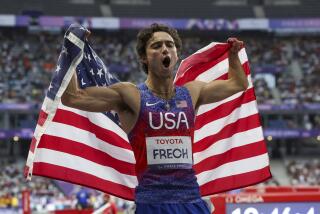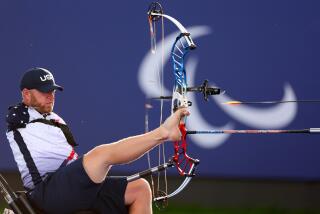Reception in Seoul Turned Paralympics Into Big-Time Event : Ready, Willing and Able
- Share via
”. . . and in lane four, from the United States of America . . .”
I heard that much of my introduction before my race--the 50-meter breaststroke--at the Seoul Paralympics last fall. The announcer must have said my name, but I was not really paying attention. I acknowledged the introduction by doing my best imitation of Matt Biondi waving to the crowd. The imitation flopped. When Biondi waved before his races at the Olympics, he seemed perfectly calm; but when I looked up to begin the gesture, my mouth fell open.
Everywhere I looked I saw people cheering. And, at that time, the cheers were for me. The possibility that a big crowd would be rooting me on never crossed my mind. I planned on a big crowd, but nothing extra. I thought the applause would come after the race because I planned on winning. But the cheers before the race changed everything.
From now on, disabled competition will be seen as athletic competition. To me, the most important aspect of the Seoul Paralympics was finally being recognized as athletes--first by the International Olympic Committee and then by the crowds. These Games set the standard for future disabled meets.
Although previous Paralympics were supposed to be Olympics for disabled athletes, they were never as exciting. In 1984, the Paralympics were held in a town south of London at an old army hospital. The Games were nothing compared to the Los Angeles Olympics. The reactions at the swim events were typical of each Games. Everyone who competed in Los Angeles had been a star; anyone who competed in England was just a person with a handicap.
I competed in England in a six-lane pool, instead of eight, with no modern conveniences--no electronic timing, no warm-up pool, no spectators. Still, the 1984 Paralympics was the fastest disabled swim meet ever. But no one other than the athletes cared.
There was no reason to believe the ’88 Paralympics would be different. Those Games began about one month after the Seoul Olympics ended. But when the U.S. disabled team arrived in Seoul, it seemed as if the Olympics were still going on.
Everywhere I looked I saw leftovers from the Olympics: directions to the competition sites on street signs; posters with the Seoul Olympic logo and colors on walls and telephone poles; stuffed dolls of the mascot in store windows. The prospects of being in the shadows of the Olympics made me long for the Paralympics of ’84. At least in England, we had been the only Games in town.
The morning after we arrived, my high hopes for an Olympic-type meet were nearly gone. Nothing was turning out as I thought; even the weather was cold. But while I was in the line for breakfast, I noticed something about one of the posters--the dates were for the Paralympics.
I was shocked: pre-meet publicity. On the ride to practice later that day, I realized that everything I thought was left over from the Olympics was actually put up for our Games. It seemed that the Paralympics, for the first time, would be like the Olympics.
Any remaining doubts were gone the moment I went inside the pool complex. The water reflected the ceiling lights so strongly that the water seemed to generate a light of its own. The pool was designed so that no turbulence would come from the sides, the bottom or other swimmers. Each lane was its own pool. Even with people in it, the pool looked calm.
But it was anything but calm. Some of the greatest races ever took place there about one month earlier. And more great races would take place there soon. To me, the facilities alone would make the Seoul Paralympics the best ever.
But competing at the Olympic sites was exciting for reasons other than the quality of the facilities. For the first time, people other than disabled athletes acknowledged our achievements. The Olympic committees recognized the Paralympics as a major sporting event. It was like being asked to play with the varsity but bigger. Until the Seoul Paralympics, we could only claim that our talents were equal to the able-bodied; in Seoul, we could prove it. And we got to prove it in front of standing-room-only crowds.
From the opening ceremony to the closing ceremony, every session in every event I attended was sold out. There were 3,000 people at one pool and 10,000 at the other, watching swimming every night. There were 15,000 fans at the table tennis arena, but no event had a bigger crowd than the opening ceremony. More than 70,000 people filled the Olympic Stadium to see the athletes parade around the track.
It could have been the opening for the Olympics. But all those people were there for the Paralympics. In fact, the ceremony were supposed to be the same as the Olympics. But I did not see either. I missed the first and was too busy at our Games to watch the organized entertainment. I thought watching the crowd would be more fun.
After my arrival in Seoul, I had become fascinated by the people there. I was sightseeing with my brothers when we met some school children on a field trip. We must have seemed very strange to them--a bald guy in a wheelchair wearing USA sweats and two 6-foot preppies.
Suddenly, we were surrounded by a mass of tiny, excited Koreans. Neither group could speak the other’s language, so we tried to communicate through gestures. Teaching them to shake hands did not present a problem, but the high-five was not as easy. After several failed attempts, they got the timing right. As a parting gesture, I let them rub my head, shaved just for the swimming events. They loved it. Most kids I have met are intimidated by my wheelchair, but those Koreans were more interested in the stubble on my head. I was eager to see if the crowd at the ceremony would overlook our handicaps as readily as the children had.
Before the ceremony began, our team coaches warned us to expect a cold reception from the crowd. The U.S. Olympic Committee was worried about the Koreans’ feelings toward Americans after the Olympics. We were told to smile through the ceremony and to wave the small U.S. flags we had been issued. Contrary to what we were told, the Koreans were not negative. In fact, they loved us. In their reserved way, they applauded us enthusiastically.
I thought it would be fun to give the flags to the crowd, so I borrowed or took flags from the people around me. However, my conscience got to me. Before we were around the track, I gave the flags back to their rightful owners.
I was not paying attention to what I was doing and I gave my flag away, too. So when I was close enough to the crowd to throw things, I had nothing to throw. The rest of the team had the same idea that I did and hundreds of flags went flying by me into the stands. I felt left out.
I wanted to give something. I had to give something. In the middle of the section of the crowd closest to us, I saw a little girl who was sad because she did not get a flag. She looked like I felt. So I took off my sweat shirt and threw it to her.
At previous meets, I was not so quick to discard my uniform, but I thought it would be worth the reaction of the girl. It was. Her face was covered with a smile. She would never grow into the shirt, but I knew she would keep it forever.
By the start of my race, the Seoul Paralympics had already given me more than I expected.
When the gun went off, I thought I would let the crowd down. Nearly everyone in the race was ahead of me. I should not have known because I should not have been looking. My race was not going as I had planned. At the 10-meter point, I started concentrating more on my race and less on theirs. I remembered that I was supposed to win.
Until the 35-meter point, I felt great. I was in the lead and I was accelerating with every stroke. But as I came up for a breath, I saw something about five meters in front of me. Realistically, I knew that no one was that far ahead of me, but reality was not a factor at this meet. If 70,000 people could watch the opening ceremony, then someone could be in front of me.
I panicked. The last 15 meters passed quickly. When I finished I was afraid to look. The crowd was as loud as it had been during the introductions, but I was not sure if the cheers were for me. If I won I was going to try another Biondi imitation, but I was afraid to find out. I wanted to know. So I looked. The imitation flopped.
More to Read
Go beyond the scoreboard
Get the latest on L.A.'s teams in the daily Sports Report newsletter.
You may occasionally receive promotional content from the Los Angeles Times.







